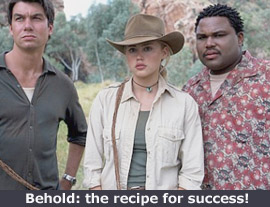The Wild Thornberrys Movie (2002) – DVD
The Wild Thornberrys
***/**** Image A Sound A Extras D
screenplay by Kate Boutilier
directed by Jeff McGrath and Cathy Malkasian
by Walter Chaw Preaching its message of courage, family, and self-confidence with grace and a bare minimum of soapbox grandstanding and mawkish sentimentality, The Wild Thornberrys Movie is a picture of warmth and imagination. Its globe-trotting wildlife-show family, the titular Thornberrys, have as their most conspicuous member gawky Eliza (voiced by Lacey Chabert), a freckled, bespectacled, orthodontically challenged little girl who earns the power to communicate with animals through an act of kindness. The locating of a traditionally unattractive young female as the superhero at the centre of an adventure serial (the picture is based on a Nickelodeon series) is so rare an idea in American animation that its appearance here makes for one of the more bracing, genuinely exciting creations of the modern popular culture. Its mainstay status in Chinese martial arts and Japanese anime films remains a gulf that U.S. culture, in its occasional simple-mindedness, remains far from bridging.

 by Walter Chaw
by Walter Chaw